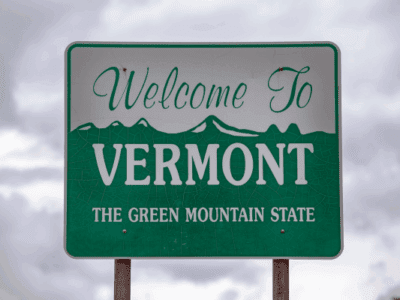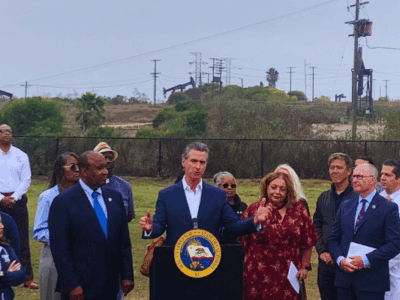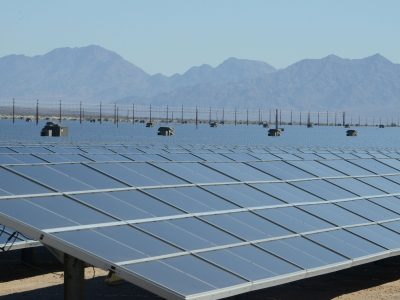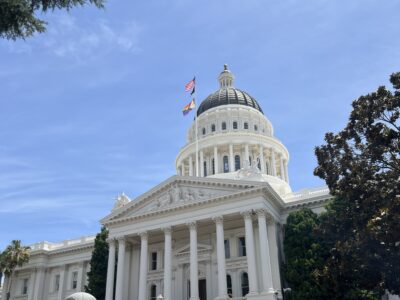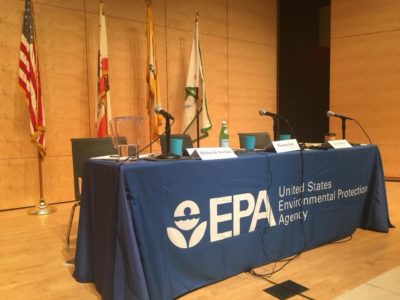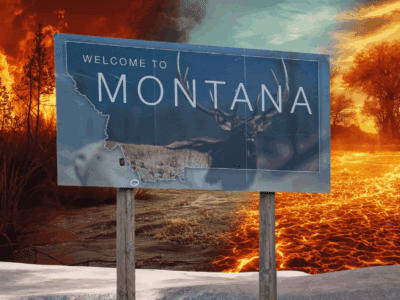DOJ Challenge to Vermont’s Climate Law Has a Problem
The EPA's proposed repeal of the endangerment finding undermines the U.S. position in the Vermont Climate Superfund Case.
EPA's proposal to rescind the Clean Air Act endangerment finding is not final but it is already causing problems for the Trump Administration in court. The Department of Justice today filed a brief for summary judgment challenging Vermont's climate superfund law. Its principal argument? That the Clean Air Act — in regulating greenhouse gases — preempts Vermont's statute. But repeal of the endangerment finding would take the U.S. out of the business of regulat...
CONTINUE READINGCalifornia Takes a Stab at Climate and Energy Costs
The Drain is a weekly roundup of environmental and climate news from Legal Planet.
It's remarkable that with everything else that’s raging, climate and energy bills still managed to dominate the legislative session that just wrapped in Sacramento. After all, the reason lawmakers were still at work this past Saturday — the day after the legislative session was supposed to end — was that negotiations on climate bills pushed them into overtime. Gov. Gavin Newsom, Senator Pro Tem McGuire, and Assembly Speaker Robert Rivas reached last-minute a...
CONTINUE READINGThe ROAD to housing?
Initial federal legislation advancing more housing is limited in scope.
There’s been a lot of legislative action advancing housing production through reforms to land-use and environmental regulations at the state level, including California. Now, the federal government is every so gingerly stepping into the area. The ROAD Act passed unanimously through the relevant Senate committee last month. In this blog post I’ll provide a brief assessment of what the Act does with respect to land-use and environmental law. The ROAD Act’s p...
CONTINUE READINGThe Color PURPA
A Win for Solar-- And a Glimpse of Life After Chevron
Jimmy Carter’s solar panels on the White House were dismantled by Reagan, but another important legacy has survived. PURPA - the Public Utility Regulatory Policies Act of 1978 – is a law designed to boost renewable energy. Last week, the D.C. Circuit ruled on an important PURPA issue, handing solar producers a win. The ruling will give a boost to solar energy in states that disfavor renewables and independent power producers. Importantly, the ruling also shows ...
CONTINUE READINGCertainty for the California Compliance Carbon Market
California’s signature climate program receives formal legislative extension through 2045.
As the California legislative session came to an end last week, Assembly and Senate leaders released a last-minute deal on formally extending California’s Cap-and-Trade Program for the next two decades through Assembly Bill (AB) 1207. The bill received the required supermajority vote on Saturday, September 13, and now moves to Governor Newsom’s desk for signature. What is Cap-and-Trade? The Cap-and-Trade Program works by establishing a declining limit (or cap) on...
CONTINUE READINGBread and Circuses and Journalism
How to get readers interested in housing and land use? Bring in reality stars!
If you want to get a good sense of the travails of the modern press, look no further than Politico’s recent writeup of SB 79, Senator Scott Wiener’s new bill to mandate upzoning around transit stops. Importantly, this isn’t because it’s a bad article but precisely because it’s a good article (and not just because Julia and I were quoted in it, although that of course helps). At 100,000 feet, Wiener’s bill is straightforward: it pre-empts local zonin...
CONTINUE READINGCalifornia Must Invest in Climate and Communities to Drive Climate Progress
The state has pioneered an approach—what’s worked, and what’s next?
As solar and other climate infrastructure construction accelerates, and with Californians concerned both about the cost of living and about seeing local opportunities result from climate projects, the conversation about community benefits (commitments to hiring and other local investments made by developers in connection with new projects) has grown increasingly animated in California and even more so in this year’s legislative session. One component enabling successfu...
CONTINUE READINGViolations of Free Speech at EPA
EPA employees were within their rights with the dissent letter they wrote.
After firing a few others, EPA recently announced mass suspensions for employees who signed a dissent letter to Zeldin (cc’d to Congress), protesting EPA’s anti-environmental policies. The discipline violates the First Amendment and quite likely the Whistleblower Act. It is part of a series of efforts to quash independent thought among civil servants: It is not enough for their actions to support administrative policies; so must their thoughts. The dissent let...
CONTINUE READINGClean up on aisle 131
Legislature should fix flaws in SB 131
As this year’s legislative session comes to a close, I want to highlight legislative action that I hope happens in the next session. I noted earlier that AB 130 and SB 131 both were important steps to advance infill housing in California by creating exemptions for infill housing from the California Environmental Quality Act (CEQA). As discussed in that post, and in prior co-authored work, such exemptions make sense from the perspective of ensuring that environmenta...
CONTINUE READINGYoung Climate Plaintiffs Won Big in Montana. Can They Again?
The Drain is a weekly roundup of environmental and climate news from Legal Planet.
One of the biggest climate victories to date belongs to 19-year-old Eva Lighthiser and the other Montana youth climate plaintiffs who won their landmark case against state officials and saw it upheld in the state Supreme Court. Now, some of those same young people — Lighthiser included — are headed back to court next week with a more formidable target: the White House. Lighthiser v. Trump challenges several of the administration's pro-fossil fuel energy execut...
CONTINUE READING



